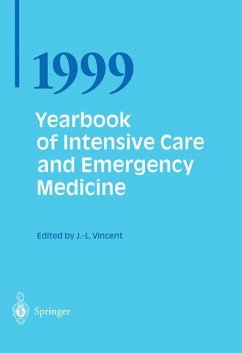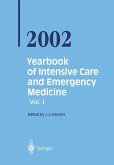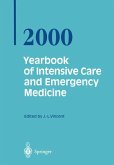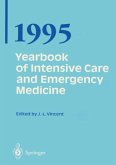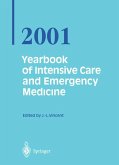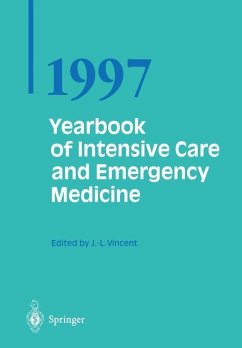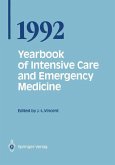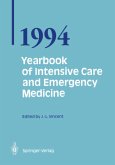Jean-Louis Vincent
Yearbook of Intensive Care and Emergency Medicine 1999
Jean-Louis Vincent
Yearbook of Intensive Care and Emergency Medicine 1999
- Broschiertes Buch
- Merkliste
- Auf die Merkliste
- Bewerten Bewerten
- Teilen
- Produkt teilen
- Produkterinnerung
- Produkterinnerung
The Yearbook compiles the most recent, widespread developments of experimental and clinical research and practice in one comprehensive reference book. The chapters are written by well recognized experts in their field of intensive care and emergency medicine. It is addressed to everyone involved in internal medicine, anesthesia, surgery, pediattrics, intensive care and emergency medicine. (With approximately 90 contributions.)
Andere Kunden interessierten sich auch für
![Yearbook of Intensive Care and Emergency Medicine 2002 Yearbook of Intensive Care and Emergency Medicine 2002]() Prof. Jean-Louis VincentYearbook of Intensive Care and Emergency Medicine 200238,99 €
Prof. Jean-Louis VincentYearbook of Intensive Care and Emergency Medicine 200238,99 €![Yearbook of Intensive Care and Emergency Medicine 2000 Yearbook of Intensive Care and Emergency Medicine 2000]() Prof. Jean-Louis VincentYearbook of Intensive Care and Emergency Medicine 200038,99 €
Prof. Jean-Louis VincentYearbook of Intensive Care and Emergency Medicine 200038,99 €![Yearbook of Intensive Care and Emergency Medicine Yearbook of Intensive Care and Emergency Medicine]() Jean-Louis VincentYearbook of Intensive Care and Emergency Medicine42,99 €
Jean-Louis VincentYearbook of Intensive Care and Emergency Medicine42,99 €![Yearbook of Intensive Care and Emergency Medicine 2001 Yearbook of Intensive Care and Emergency Medicine 2001]() Jean-Louis VincentYearbook of Intensive Care and Emergency Medicine 2001163,99 €
Jean-Louis VincentYearbook of Intensive Care and Emergency Medicine 2001163,99 €![Yearbook of Intensive Care and Emergency Medicine 1997 Yearbook of Intensive Care and Emergency Medicine 1997]() Jean-Louis VincentYearbook of Intensive Care and Emergency Medicine 1997113,99 €
Jean-Louis VincentYearbook of Intensive Care and Emergency Medicine 1997113,99 €![Yearbook of Intensive Care and Emergency Medicine 1992 Yearbook of Intensive Care and Emergency Medicine 1992]() Jean-Louis VincentYearbook of Intensive Care and Emergency Medicine 199281,99 €
Jean-Louis VincentYearbook of Intensive Care and Emergency Medicine 199281,99 €![Yearbook of Intensive Care and Emergency Medicine 1994 Yearbook of Intensive Care and Emergency Medicine 1994]() Jean-Louis VincentYearbook of Intensive Care and Emergency Medicine 199441,99 €
Jean-Louis VincentYearbook of Intensive Care and Emergency Medicine 199441,99 €-
-
-
The Yearbook compiles the most recent, widespread developments of experimental and clinical research and practice in one comprehensive reference book. The chapters are written by well recognized experts in their field of intensive care and emergency medicine. It is addressed to everyone involved in internal medicine, anesthesia, surgery, pediattrics, intensive care and emergency medicine. (With approximately 90 contributions.)
Hinweis: Dieser Artikel kann nur an eine deutsche Lieferadresse ausgeliefert werden.
Hinweis: Dieser Artikel kann nur an eine deutsche Lieferadresse ausgeliefert werden.
Produktdetails
- Produktdetails
- Yearbook of Intensive Care and Emergency Medicine 1999
- Verlag: Springer / Springer Berlin Heidelberg / Springer, Berlin
- Artikelnr. des Verlages: 978-3-540-65288-5
- 1999
- Seitenzahl: 740
- Erscheinungstermin: 8. März 1999
- Englisch
- Abmessung: 244mm x 170mm x 40mm
- Gewicht: 1147g
- ISBN-13: 9783540652885
- ISBN-10: 3540652884
- Artikelnr.: 09211064
- Herstellerkennzeichnung Die Herstellerinformationen sind derzeit nicht verfügbar.
- Yearbook of Intensive Care and Emergency Medicine 1999
- Verlag: Springer / Springer Berlin Heidelberg / Springer, Berlin
- Artikelnr. des Verlages: 978-3-540-65288-5
- 1999
- Seitenzahl: 740
- Erscheinungstermin: 8. März 1999
- Englisch
- Abmessung: 244mm x 170mm x 40mm
- Gewicht: 1147g
- ISBN-13: 9783540652885
- ISBN-10: 3540652884
- Artikelnr.: 09211064
- Herstellerkennzeichnung Die Herstellerinformationen sind derzeit nicht verfügbar.
Predisposition to Critical Illness.- Prevention of Critical Illness: Determinants of Risk.- Pro-Inflammatory Cytokine Genomic Polymorphism and Critical Illness.- Immunologic Responses.- Bacterial Modulation of the Immune Response to Infection and its Consequences.- Treating Immunologic Instability: A Change in Focus.- Interleukin-6 in Bacterial Infection and Sepsis: Innocent Bystander or Essential Mediator?.- Complement Activation by C-Reactive Protein: An Inflammatory Mechanism in Human Disease?.- Influence of Nutrition on Mucosal Immunity.- Metabolic Support.- Studies of Protein and Amino Acid Metabolism in the Human Liver.- Anabolic Strategy in ICU Patients: Is there a Place for Growth Hormone?.- Controversies in Nutrition of the Critically Ill.- The Hemodynamic Response to Enteral Nutrition.- Infectious Challenges.- Clinical Significance of Antimicrobial Resistance.- Colonization and Infection with Pseudomonas aeruginosa in Intensive Care: Endogenous or Exogenous Origin?.- Severe Pneumonia in the Elderly.- The Role of Pulmonary Bacterial Infections in Severe Exacerbations of COPD Patients.- Treatment of Septic Shock.- Volume Kinetics: A New Method to Optimize Fluid Therapy.- Why, When, and How I Use Norepinephrine in the Treatment of Septic Shock.- Stress Doses of Hydrocortisone in Septic Shock: Beyond the Hemodynamic Effects.- Altered Respiratory Function.- Breathing Pattern of Patients with COPD.- Lung Mechanics in ARDS.- Mechanical Ventilation.- The Laryngeal Mask in Emergency Medicine and Intensive Care Medicine.- Improving Patient/Ventilator Interactions.- Beneficial Effects of Helium-Oxygen Mixtures in Acute Respiratory Failure.- Mechanisms of Regional Lung Expansion in Acute Respiratory Distress Syndrome.- Lung Protection during Mechanical Ventilation.- Neuromuscular Failure.- Diagnosing Respiratory Muscle Weakness.- Interaction of Respiratory Muscles and Circulation in Heart Failure.- Assessment of Respiratory and Limb Muscle Function in the Intensive Care Unit.- Risk Factors for Polyneuromyopathy of Critical Illness.- Neurologic Problems.- Emergency Treatment and Intensive Care in Ischemic Stroke.- Intensive Care Management of Aneurysmal Subarachnoid Hemorrhage.- Magnetic Resonance Spectroscopy and Neurotrauma.- Cell Oxygenation.- Coping with Hypoxia.- Intracellular Signaling by Reactive Oxygen Species during Hypoxia.- Heme Oxygenase and Acute Lung Injury: The Functional Significance of Heme Oxygenase Induction.- Protective Role of Inhaled Nitric Oxide in Ischemia/Reperfusion and Endotoxin-Induced Inflammation.- Oxygen Delivery.- Oxygen Therapy in Intensive Care Patients: A Vital Poison?.- The Significance of the P50.- The Red Blood Cell and Nitric Oxide.- Cardiovascular Monitoring.- Continuous Arterial Thermodilution Cardiac Output and Derived Variables.- Transesophageal Eunncardiographic Evaluation of Left Ventricular function.- The Esophageal Doppier.- Cardiovascular Alterations.- Myocardial Inducible Nitric Oxide Synthase and Left Ventricular Performance in the Human Heart.- Alteration of the Beta-Adrenergic Pathway in the Septic Heart.- Autonomic Dysfunction in Critically Ill Patients.- Gut Ischemia.- The Role of the Gut in Multiple Organ Failure.- Gastric Intramucosal Acidosis, pHi and the Tonometer: What is the Benefit for Patients?.- Coagulation Abnormalities.- Hemolytic Uremic Syndrome/Thrombotic Thrombocytopenic Purpura in the ICU.- Point-Of-Care Monitoring of Coagulation in the Critically Ill.- Peri-Operative Complications.- Peri-Operative Risk Factors for Post-Operative Pulmonary Complications.- Rationale Behind "Off Pump" Coronary Surgery: Why Patients Tolerate it Better?.- Renal Support.- The History of Continuous Renal Replacement Techniques.- Continuous Renal Replacement Therapies in Sepsis: Do they Matter?.- Drug Addiction.- Drugs of Abuse in the Intensive Care Unit Setting.- Ecstasy (MDMA): An Update.- Rapid Opiate Detoxification Under General Anesthesia: A New Challenge for Anesthesiologists and Intensivists.- Economics and Ethics.- Survival is not Enough: Quality of Life After Intensive Care.- Economic Perspectives on Intensive Care Medicine.- Health Economics in Intensive Care.- Ethical Implications of Standardizing Clinical Decisions with Computerized Protocols.- Medical Futility in the New Millennium: Our View.
Predisposition to Critical Illness.- Prevention of Critical Illness: Determinants of Risk.- Pro-Inflammatory Cytokine Genomic Polymorphism and Critical Illness.- Immunologic Responses.- Bacterial Modulation of the Immune Response to Infection and its Consequences.- Treating Immunologic Instability: A Change in Focus.- Interleukin-6 in Bacterial Infection and Sepsis: Innocent Bystander or Essential Mediator?.- Complement Activation by C-Reactive Protein: An Inflammatory Mechanism in Human Disease?.- Influence of Nutrition on Mucosal Immunity.- Metabolic Support.- Studies of Protein and Amino Acid Metabolism in the Human Liver.- Anabolic Strategy in ICU Patients: Is there a Place for Growth Hormone?.- Controversies in Nutrition of the Critically Ill.- The Hemodynamic Response to Enteral Nutrition.- Infectious Challenges.- Clinical Significance of Antimicrobial Resistance.- Colonization and Infection with Pseudomonas aeruginosa in Intensive Care: Endogenous or Exogenous Origin?.- Severe Pneumonia in the Elderly.- The Role of Pulmonary Bacterial Infections in Severe Exacerbations of COPD Patients.- Treatment of Septic Shock.- Volume Kinetics: A New Method to Optimize Fluid Therapy.- Why, When, and How I Use Norepinephrine in the Treatment of Septic Shock.- Stress Doses of Hydrocortisone in Septic Shock: Beyond the Hemodynamic Effects.- Altered Respiratory Function.- Breathing Pattern of Patients with COPD.- Lung Mechanics in ARDS.- Mechanical Ventilation.- The Laryngeal Mask in Emergency Medicine and Intensive Care Medicine.- Improving Patient/Ventilator Interactions.- Beneficial Effects of Helium-Oxygen Mixtures in Acute Respiratory Failure.- Mechanisms of Regional Lung Expansion in Acute Respiratory Distress Syndrome.- Lung Protection during Mechanical Ventilation.- Neuromuscular Failure.- Diagnosing Respiratory Muscle Weakness.- Interaction of Respiratory Muscles and Circulation in Heart Failure.- Assessment of Respiratory and Limb Muscle Function in the Intensive Care Unit.- Risk Factors for Polyneuromyopathy of Critical Illness.- Neurologic Problems.- Emergency Treatment and Intensive Care in Ischemic Stroke.- Intensive Care Management of Aneurysmal Subarachnoid Hemorrhage.- Magnetic Resonance Spectroscopy and Neurotrauma.- Cell Oxygenation.- Coping with Hypoxia.- Intracellular Signaling by Reactive Oxygen Species during Hypoxia.- Heme Oxygenase and Acute Lung Injury: The Functional Significance of Heme Oxygenase Induction.- Protective Role of Inhaled Nitric Oxide in Ischemia/Reperfusion and Endotoxin-Induced Inflammation.- Oxygen Delivery.- Oxygen Therapy in Intensive Care Patients: A Vital Poison?.- The Significance of the P50.- The Red Blood Cell and Nitric Oxide.- Cardiovascular Monitoring.- Continuous Arterial Thermodilution Cardiac Output and Derived Variables.- Transesophageal Eunncardiographic Evaluation of Left Ventricular function.- The Esophageal Doppier.- Cardiovascular Alterations.- Myocardial Inducible Nitric Oxide Synthase and Left Ventricular Performance in the Human Heart.- Alteration of the Beta-Adrenergic Pathway in the Septic Heart.- Autonomic Dysfunction in Critically Ill Patients.- Gut Ischemia.- The Role of the Gut in Multiple Organ Failure.- Gastric Intramucosal Acidosis, pHi and the Tonometer: What is the Benefit for Patients?.- Coagulation Abnormalities.- Hemolytic Uremic Syndrome/Thrombotic Thrombocytopenic Purpura in the ICU.- Point-Of-Care Monitoring of Coagulation in the Critically Ill.- Peri-Operative Complications.- Peri-Operative Risk Factors for Post-Operative Pulmonary Complications.- Rationale Behind "Off Pump" Coronary Surgery: Why Patients Tolerate it Better?.- Renal Support.- The History of Continuous Renal Replacement Techniques.- Continuous Renal Replacement Therapies in Sepsis: Do they Matter?.- Drug Addiction.- Drugs of Abuse in the Intensive Care Unit Setting.- Ecstasy (MDMA): An Update.- Rapid Opiate Detoxification Under General Anesthesia: A New Challenge for Anesthesiologists and Intensivists.- Economics and Ethics.- Survival is not Enough: Quality of Life After Intensive Care.- Economic Perspectives on Intensive Care Medicine.- Health Economics in Intensive Care.- Ethical Implications of Standardizing Clinical Decisions with Computerized Protocols.- Medical Futility in the New Millennium: Our View.

